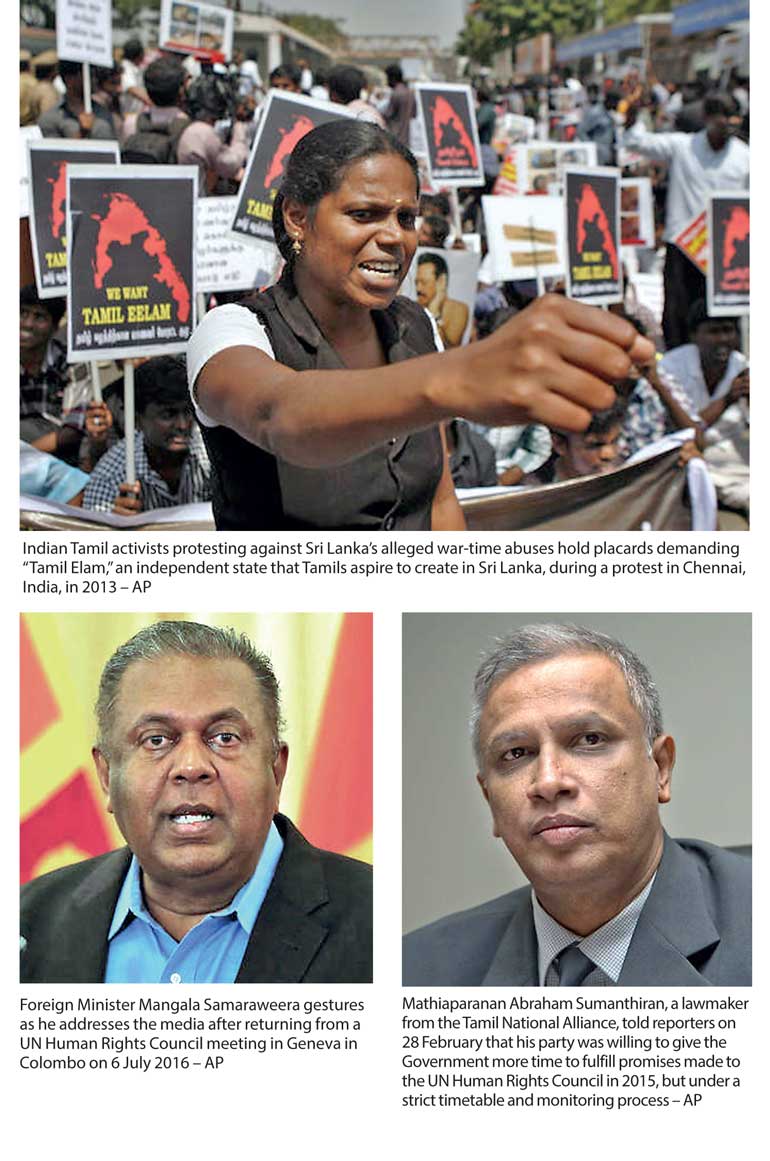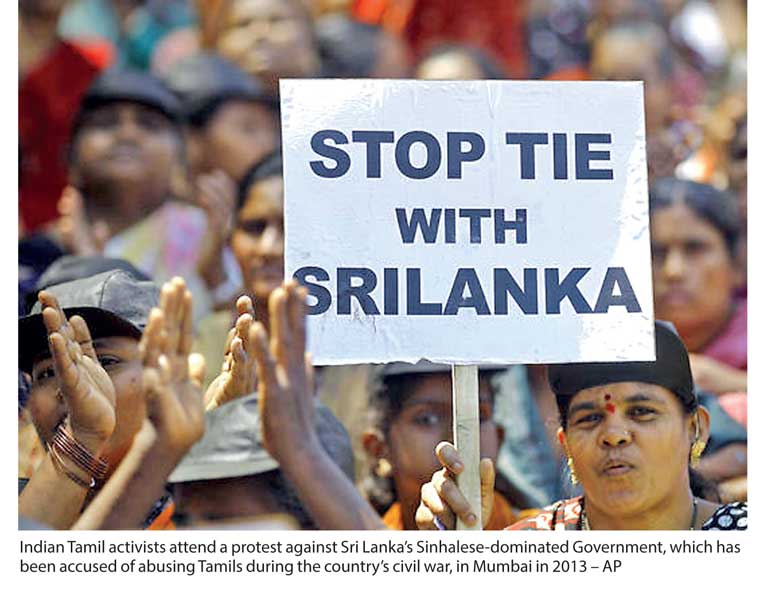Tuesday Feb 17, 2026
Tuesday Feb 17, 2026
Wednesday, 3 May 2017 03:00 - - {{hitsCtrl.values.hits}}


By Marwaan Macan-Markar, Asia regional correspondent
asia.nikkei.com: The pain of Sri Lanka’s civil war, which ended in May 2009, continues to haunt residents in the eastern coastal town of Batticaloa and its surrounding villages. Punyamurthi Jeyatheepa, a 32-year-old social worker, is still searching for her husband, Pathmashri, who left their home on May 23, four days after the guns fell silent, and disappeared after a military mop-up operation near their village north of Batticaloa.
Jeyatheepa remembers the red T-shirt and blue jeans her husband wore on the morning she last saw him. She remembers the two rings he had on the second toe of each foot and the scar near his waist from an operation. When she recalls the tattoo of her name and two red hearts on his right arm, her face crumples and she cries silently.
Details like these matter for families of the “disappeared” – a grim legacy of the 26-year civil war between the Sri Lankan military and the Tamil Tigers guerilla army. If a body is unearthed across the island’s north and east battlefield during the separatist conflict, a tattoo or ring could be the key to identification.
An estimated 40,000 people were killed in the final four months of the conflict, according to a United Nations report, with the war’s total death toll exceeding 100,000. The coalition Government of President Maithripala Sirisena said last year that Government commissions had received 65,000 complaints of missing persons related to the civil war and a violent Marxist uprising in the southern and central regions in the late 1980s.
The Sirisena administration has earned international praise for its honesty regarding the scale of the disappearances and its successful bid last August to gain parliamentary approval to establish a permanent Office of Missing Persons (OMP). Sirisena’s Government, which defeated the previous regime led by autocratic President Mahinda Rajapaksa in an election in January 2015, also appears warmer toward three other benchmarks of post-war justice: a special tribunal for war crimes, a truth and reconciliation commission, and compensation for the victims.
But the Government has dragged its feet on converting assurances into action, and patience among the international community is wearing thin. The European Commission has linked improvements in Sri Lanka’s human rights record to a pledge to resume granting tariff concessions under its Generalised System of Preferences plus (GSP+) for exports to the European Union, the largest market for Sri Lankan products.
The GSP+ allows developing countries to pay no duties on their exports to the EU. The island lost some 10,000 jobs as factories shut down in the wake of the EU suspension, which was imposed in August 2010 in protest at the Rajapaksa administration’s failings on human rights.
If the EU were to reinstate the GSP+ tariffs, Sri Lanka could earn an additional $1.9 billion a year in exports – primarily through its garments sector, according to current Finance Minister Ravi Karunanayake. But in mid-April, a European parliamentary group warned against granting the GSP+ concessions at an upcoming vote in May, accusing the Sri Lankan Government of “not adequately tackling the culture of impunity by rewarding military officials guilty of human rights violations with government positions.”
Without the benefit of GSP+, Sri Lanka has struggled to compete with other Asian clothing exporters for EU market share. Vietnam, Pakistan and Cambodia all trailed Sri Lanka in 2009, earning $2.1 billion, $1.5 billion and $1.09 billion respectively from EU exports against Sri Lanka’s $ 2.3 billion, according to the International Trade Centre, a joint agency of the World Trade Organization and the United Nations. By 2015, however, Vietnam’s apparel exports to the EU had risen to $3.9 billion, Pakistan’s to $2.9 billion and Cambodia’s to $3.7 billion, with Sri Lanka stuck at $2.4 billion.
The opportunity to be readmitted to the program also comes as the island nation’s $80.5 billion economy wobbles on multiple fronts. Its narrow export base, largely garments and tea, has exposed the country’s growing trade deficit, which rose from $8.4 billion during the 2015 calendar year to $9.1 billion in 2016, according to the Central Bank. Export earnings dropped by 2.2% in 2016, while imports rose 2.5%. Foreign direct investment was $44.5 million in 2016, a 34% drop from the previous year. Restoring the GSP+ tariffs by tackling outstanding human rights issues could provide a vital boost for the ailing economy.
Premachandra Athukorala, Professor of Economics at the Australian National University in Canberra, noted that the Sirisena administration has limited room to maneuver on the European trade front. “The Sri Lankan Government does not have any other choice now because the intransigent approach of the previous regime to [the] GSP+ issue has strengthened the hands of the EU negotiators,” he said.
Domestically, in bowing to the EU and pledging to implement its transitional justice promises made to the United Nations Human Rights Council in Geneva, the Government has drawn political heat from the Rajapaksa-led opposition.
Allies of the former strongman are sending ultra-nationalist messages to appeal to Sri Lanka’s largest constituency, the Sinhalese-Buddhist ethnic majority.
In late March, after the Sirisena administration won a two-year extension to implement a 2015 UNHRC resolution, Rajapaksa’s allies accused the government of caving in to foreign pressure by agreeing to set up a war crimes tribunal. The opposition is pushing for a debate in the Parliament about the “Geneva resolution”.
Representatives of the Tamil community, the country’s largest ethnic minority and which faced the brunt of the civil war, have their own complaints.
They point to lack of progress from the administration on several fronts. “Sri Lanka has not accomplished even one of what [measures were] agreed in the October 2015 Geneva resolution, and even the OMP has not been brought into operation,” said Mathiaparanan Sumanthiran, a Parliamentarian of the Tamil National Alliance.
Human rights activists and lawyers seeking justice for the victims also direct criticism toward the United Nations. “The United Nations has a moral responsibility to ensure justice for Sri Lanka, because the UN failed in its role during the conflict,” said Sherine Xavier, Director of The Social Architects, a human rights watchdog body in northeast Sri Lanka.
The Office of Missing Persons has, consequently, become an initial measure of the Government’s political commitment to justice. “Families of the missing are desperate for answers and have provided graphic details of Army camps and name of the perpetrators they accuse of being involved,” said Kanagasabai Ratnavale, a lawyer who represents Tamil victims of the war, of the office that is still only a shell. “They are not interested in compensation; they want accountability.”
In Batticaloa, Tamil women like Jeyatheepa are still holding on to hope. They are knocking on official doors, filing petitions for information and even going into debt to unearth the trail of the missing kin. Yet, a harsh truth awaits them. Only a minority may learn the fate of their missing relatives, given the years that have elapsed and the numbing magnitude of Sri Lanka’s disappeared – the second highest in the world after war-torn Iraq, according to the UN.
“Realistically, only a very few families are likely to know details of what happened to their loved ones through the OMP,” said Ruki Fernando of the Human Rights Documentation Center, a local organisation. “It is unlikely that the OMP will be able to find specific answers about the 65,000, and potentially more, who are missing or disappeared.”